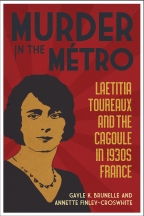
296 pages / 6.00 x 9.00 inches / 11 halftones
History / West European | History / France | Women's Studies
On the evening of May 16, 1937, the train doors opened at the Porte Dorée station in the Paris Métro to reveal a dying woman slumped by a window, an eight-inch stiletto buried to its hilt in her neck. No one witnessed the crime, and the killer left behind little forensic evidence. This first-ever murder in the Paris Métro dominated the headlines for weeks during the summer of 1937, as journalists and the police slowly uncovered the shocking truth about the victim: a twenty-nine-year-old Italian immigrant, the beautiful and elusive Laetitia Toureaux. Toureaux toiled each day in a factory, but spent her nights working as a spy in the seamy Parisian underworld. Just as the dangerous spy Mata Hari fascinated Parisians of an earlier generation, the mystery of Toureaux's murder held the French public spellbound in pre-war Paris, as the police tried and failed to identify her assassin.
In Murder in the Métro, Gayle K. Brunelle and Annette Finley-Croswhite unravel Toureaux's complicated and mysterious life, assessing her complex identity within the larger political context of the time. They follow the trail of Toureaux's murder investigation to the Comité Secret d’Action Révolutionnaire, a secret right-wing political organization popularly known as the Cagoule, or "hooded ones." Obsessed with the Communist threat they perceived in the growing power of labor unions and the French left wing, the Cagoule's leaders aimed to overthrow France's Third Republic and install an authoritarian regime allied with Italy. With Mussolini as their ally and Italian fascism as their model, they did not shrink from committing violent crimes and fomenting terror to accomplish their goal. In 1936, Toureaux--at the behest of the French police--infiltrated this dangerous group of terrorists and seduced one of its leaders, Gabriel Jeantet, to gain more information. This operation, the authors show, eventually cost Toureaux her life.
The tale of Laetitia Toureaux epitomizes the turbulence of 1930s France, as the country prepared for a war most people dreaded but assumed would come. This period, therefore, generated great anxiety but also offered new opportunities--and risks--to Toureaux as she embraced the identity of a "modern" woman. The authors unravel her murder as they detail her story and that of the Cagoule, within the popular culture and conflicted politics of 1930s France.
By examining documents related to Toureaux's murder--documents the French government has sealed from public view until 2038--Brunelle and Finley-Croswhite link Toureaux's death not only to the Cagoule but also to the Italian secret service, for whom she acted as an informant. Their research provides likely answers to the question of the identity of Toureaux's murderer and offers a fascinating look at the dark and dangerous streets of pre-World War II Paris.
Gayle K. Brunelle, professor of history at California State University at Fullerton, is the author of The New World Merchants of Rouen, 1559–1630 and Samuel de Champlain: Founder of New France.
Annette Finley-Croswhite is a professor of history at Old Dominion University in Norfolk, Virginia. She is the author of Henry IV and the Towns: The Pursuit of Legitimacy in French Urban Society, 1589–1610.
“Brunelle and Finley-Croswhite have produced a gripping historical whodunnit with chilling implications for our understanding of post-war France.”—Times Literary Supplement
“On one level, Murder in the Métro is a skillfully told detective story....This is a great book: a gripping read and a fascinating insight into 1930s France.”—American Historical Review
“A readable and illuminating narrative.”—Journal of Modern History
“Brunelle and Finley-Croswhite have produced an exceptionally fine work that is well-researched and documented and consistently compelling.”—Publishers Weekly
“This book really is a very good narrative: were it to be televised it would resemble a combination of The World at War and New Tricks.”—French Studies
“[The book] offers rich insight into the culture, society, and politics of the polarized 1930s. It presents with sensitivity the struggles of an Italian immigrant woman 'to make something of herself' while faced with limited options. The authors give a detailed account, gleaned from intensive research in primary and secondary sources, of a much neglected aspect of 1930s France.”—Joel Blatt, French Politics, Culture, and Society
“A well-written and thought-provoking work that generously offers leads to other researchers.”—Canadian Journal of History
Interview with Gayle K. Brunelle and Annette Finley-Croswhite (New Books in Biography)
Found an Error? Tell us about it.